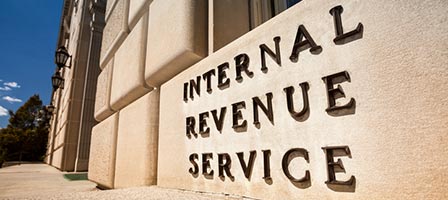Odds of Being Targeted by the IRS for Audit
05/30/2017
On December 22, 2017, The Tax Cuts and Jobs Act was signed into law. The information in this article predates the tax reform legislation and may not apply to tax returns starting in the 2018 tax year. You may wish to speak to your tax advisor about the latest tax law. This publication is provided for your convenience and does not constitute legal advice. This publication is protected by copyright.

Article Highlights:
- IRS Audit Focus
- Data Book
- Tax Revenues
- Audits by Income
- EITC Top Audit Target
If you, like others, dread the thought of being audited by the IRS, then you should know that the IRS, like any good business, concentrates its efforts where they produce the best results (revenue)! Thus, its audit selection process favors returns that claim the earned income tax credit (EITC), for which a lot of fraud is prevalent, as well as business returns and returns for higher income taxpayers.
Every year, the IRS releases the “Data Book,” which describes activities conducted by the IRS during the prior fiscal Year. It provides, among other things, information about how many tax returns the IRS examined (audits), how it examined them and what categories of returns the IRS focused its resources on. The most recent Data Book includes audit data from fiscal year 2016.
The IRS collected more than $3.3 trillion in gross taxes and issued more than 122.3 million refunds totaling more than $426.1 billion. The IRS also collected almost $345.6 billion in income taxes, before re¬funds, from businesses.
The IRS audited 0.7 percent of all individual income tax returns filed in calendar year 2015 and 1.1 percent of corpo¬ration income tax returns (excluding S corporation returns). The table below illustrates the percentages of individual returns filed based on income (adjusted gross income) and the percent audited in each category.
Individual Returns Filed & Audited
| Adjusted Gross Income | Percent of Total Returns Filed | Percent Audited |
|---|---|---|
| None | 1.70 | 3.25 |
| $1 to under $25,000 | 37.45 | 0.80 |
| $25,000 to under $50,000 | 23.21 | 0.49 |
| $50,000 to under $75,000 | 13.20 | 0.41 |
| $75,000 to under $100,000 | 8.52 | 0.52 |
| $100,000 to under $200,000 | 11.72 | 0.62 |
| $200,000 to under $500,000 | 3.38 | 1.01 |
| $500,000 to under $1,000,000 | 0.54 | 2.06 |
| $1,000,000 to under $5,000,000 | 0.25 | 4.60 |
| $5,000,000 to under $10,000,000 | 0.02 | 10.46 |
| $10,000,000 or more | 0.01 | 18.79 |
| All returns | 100.00 | 0.70 |
However, that is not the whole story. Of the 1,034,955 individual income tax returns that were audited, roughly 36.7% (380,260) were selected for examination on the basis of an earned income tax credit (EITC) claim. Only 23.6% of the individual audits were face-to-face audits conducted by revenue agents, tax compliance officers, tax examiners or revenue officer examiners. The remaining 76.4% were conducted by correspondence.
If you receive an audit letter or correspondence from the IRS or state taxing authority questioning your tax return, your first call should be to this office. This is especially true with all of the scammers out there pretending to represent the IRS and state taxing authorities. Remember: the IRS does not initiate contact by e-mail.
2017 Archives
LINDSTROM ACCOUNTANCY CORP.
2291 W March Lane Ste D105, Stockton CA 95207
(209) 451-0428 FAX (209) 451-0593
© web design by one eleven stockton, ca
